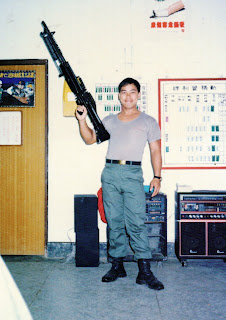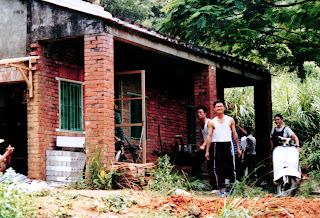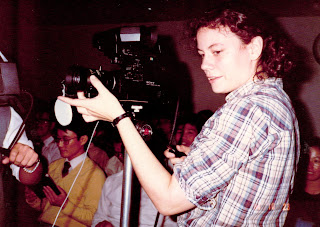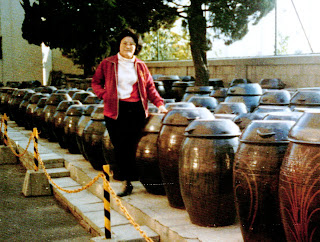Now that the foreman had his crew leader, work could begin in earnest the next day. The men and boys sat around the table outside laying out plans for the surveying paths that we would cut, while I used the new kitchen equipment to make dinner for everyone. By this time I was quite proficient at whipping up rice, three dishes and a soup for at least eleven people. The foreman had brought groceries for dinner, so there was plenty to cook with.
Night came early to the mountain. Since we were in the middle of the jungle, there were no city lights, and once the sun went down, it was inky black outside. The cicadas chirped incessantly. Bats flew in the clearing. There were mosquitoes everywhere outside the hut. After dinner, as the sun was setting, Liu Yuni and the foreman took a sack of lime and laid a track around the hut to keep snakes out. As they came in, they noted that several tree branches overhung the roof, so the lime would be no good against snakes dropping down from the trees, but they were fairly confident that we should be safe. No one had mentioned the matter of snakes getting into the cabin to me. I was more than a little perturbed.
The foreman had all the men use the restrooms off the kitchen one last time. Then he gave me a rollaway to set up in the kitchen and showed me the lock on the inside of the door. I was to lock myself in the kitchen all night while the men and boys slept in the other room. Of course, they had the lantern for light, so they stayed up playing cards and talking. I just went to bed, since I was supposed to get up first and make breakfast anyway. At least I knew I would have hot water for my shower because I could keep them all locked out till I was done.
Early the next morning, we ate a full meal of rice, meat and vegetables; by eight in the morning we were divided into two groups along ridges in the jungle. Each of us was armed with a machete or a weed whacker, and we cut paths through the thick vegetation along the contour lines of the hill so the surveyors could take their sights to get the right dimensions and elevations of the property. Liu Yuni took half the college men; the foreman took me and the other half. Most of them did not like the work. It was hot and muggy; we had to wear long sleeves and heavy pants or the jungle grass would cut us. We also had bandanas or towels covering our necks, hats, and heavy work gloves. The foreman and I did about 75% of the work on our team. Around 11, I left the group to make lunch. They came in at 12:30, ate and took a siesta through the hottest part of the day. As he was helping me wash the dishes, Liu Yuni informed me that 85% of his team did nothing all morning. The person who ate the most for lunch was the one who had done the least work. I suggested that he consult with the foreman.
In the afternoon, we switched teams, but to no avail. The college men were mostly city boys, who had not realized how hard it was to do physical labor. They had envisioned a relaxing two weeks of digging bamboo shoots in the jungle, cooking sweet potatoes in earth ovens and having cookouts and barbecues. I think they mistook the words “work party” for “summer camp.” On the third day, General Manager came and told the foreman he was needed every afternoon in Taipei for meetings with the planning commission. Since I was there in the hut, the foreman would have to spend each night there to chaperone, but he would leave at 10 am and not come back until dinner time.
With the foreman gone, the college men mutinied. They did not want to be on my crew because they would get shown up by a girl (or worse, managed by a woman). They did not want to be on Liu Yuni’s crew because he was stronger than they, and they weren’t sure he was non-violent. So they said that Liu Yuni and I were one crew and the rest of them were the other. That was fine with us; we worked well together and got more accomplished that afternoon than we had the previous two days. We did not bother to call the others for dinner. At the appropriate time, we both went to the cabin and cooked together. We were almost finished eating by the time they thought to come home for dinner. (They were never late for another meal afterwards.) And so the week went on.
In the beginning of the second week, I was in the cabin making lunch when I heard a noise on the roof. I went into the men’s sleeping room to investigate and watched horrified as a large Krait worked its way into the cabin through a chink between the eaves and the top of the wall. It was at least four feet long. It then began slithering along the top of the wall toward the beam. All I could think of was that if it got to the beam, it could come into the kitchen and drop down on me while I was cooking or sleeping. I grabbed my machete, stood on the bottom bunk of the bunk bed, leaned across the top bunk and tried to chop its head off. I was shaking so badly that I did not cut it clean. It began twisting and writhing and fell off the wall onto the metal bed frame. It hung there in its death throes dripping blood all over someone’s bedding and the floor. I was convinced it was going to get me.
So I ran outside and watched it through the screen door. It was hanging there twisting its head and body and struggling. Suddenly, it dropped to the floor and went under the bed. Now I was really scared. (Fortunately, I had turned off the flame on the stove before trying to kill it.) I wasn’t quite sure what to do, when I heard the sound of a duck quacking. Liu Yuni was back to get new blades for the weed whackers. I explained to him the problem. He grabbed my machete and went into the cabin. I stayed wisely outside, in case I had to ride his motorcycle into town for help. He saw the snake motionless under the bed and figured it might be already dead. He poked it with the machete and it writhed and hissed. So he took a clothes hangar and made a snake hook. He pulled it out with the hook around the head and swiftly beheaded it. Then he took it out and threw it on the garbage pile. My hero!!
I went back happily into the cabin to finish making lunch. Liu Yuni was still outside scrutinizing the snake. He cleaned the machete and came back into the cabin, handing it to me. He suggested I wear it while I was cooking because Kraits usually mate for life and when one dies the mate will comes looking for it. He thought we had killed the female and that the male would be even longer and larger. He said that folk tradition said these snakes took revenge for the death of the mate. With those cheery words of comfort, he left with the saw blades for the weed cutters. Now I was really scared, but I needed to finish making lunch.
The rest of the day passed without incident. At night, the foreman returned and looked at the dead snake. He agreed that we needed to watch out for the return of the mate, so they poured extra lime all around the cabin. We all went to bed with a certain amount of trepidation. Early the next morning a sound in the bathroom woke me up. I went in, and as I passed through the door, I caught a glimpse of something in a crack in the wall just at eye level. I moved slowly past and looked back. There was a huge snake in the first stall of the restroom. I held my breath and ran past it, rushing into the men’s room shouting “Snake!” The foreman leaped out of bed, put on his boots, grabbed his machete and ran outside. I thought, “That’s really great. He’s running away from it.” Liu Yuni got up more slowly, grabbed his coat hanger snake hook and a machete, and went into the kitchen. I told him where it was. He and Uncle Chou (an elderly man who had come up that week as a chaperone and assistant foreman to keep the boys working) figured out a plan to extract the snake and kill it. By this time, the foreman had discovered his mistake and was back inside working with them. The three of them successfully dislodged the snake and killed it. It was indeed much larger than the one I had killed the previous noon.
For the most part, the boys had stayed huddled in their beds hoping the snake didn’t come bite them. They were afraid to go outside in the dark, too, because there might be whole herds of snakes outside. On the whole, they were a pretty useless bunch. The only project they worked on with gusto was during lunch on the last three days. The foreman said that if they cleared a field we would have a barbecue and sweet potato roast beside the cabin and invite some of the college girls up for the party. He also said that the girls could only come up if the surveying paths in one sector of the property were completely finished. We did get quite a bit of work out of them those last three days.
And so we had our business plan. The college interns came up for two week shifts. Liu Yuni stayed all the rest of the summer. I wound up going back to Taipei at night. (General Manager didn’t like the idea of me sleeping in a place with snakes.) I took a 6 am bus up to the property; the men ate peanut butter sandwiches for breakfast. The foreman brought groceries some time during the late afternoon and stocked the refrigerator daily. I worked from 8 to 11, cooked lunch, worked again from 2 till 5, cooked dinner and then went home after dinner with the foreman. Every evening the foreman laid out the next day’s assignment. If all the work was finished each week, the men hosted a barbecue for college women and other friends on Sunday afternoons. It was a great six weeks. And the more we worked together, the more Liu Yuni and I realized we were pretty compatible. After all, he was the dragon-slaying hero who had saved my life.






























